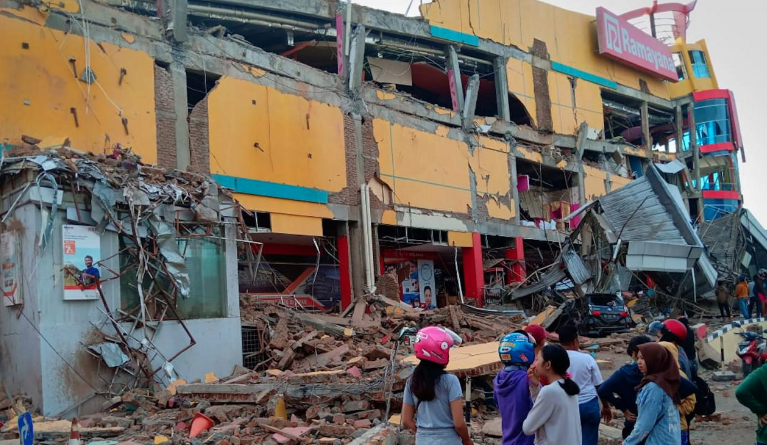PALU, Indonesia (Reuters) – At least 384 people were killed, many swept away by giant waves as they played on the beach, when a major earthquake and tsunami hit the Indonesian island of Sulawesi, authorities said on Saturday.
Hundreds had gathered for a festival on the beach of the city of Palu on Friday when waves up to six metres (18 feet) high smashed ashore just on dusk, sweeping many to their death and destroying anything in their path.
“When the (tsunami) threat arose yesterday, people were still doing their activities on the beach and did not immediately run and they became victims,” Sutopo Purwo Nugroho, spokesman of Indonesia’s disaster mitigation agency BNPB said in news briefing in Jakarta.
“The tsunami didn’t come by itself, it dragged cars, logs, houses, it hit everything on land,” Nugroho said.
Some people climbed six metre (18 feet) trees to escape the tsunami and survived, he said.
Amateur footage shown by local TV stations showed waves crashing into houses along Palu’s shoreline, scattering shipping containers and flooding into a mosque in the city.
Nugroho said the tsunami had struck with a speed of 800 kmph (497 mph), destroying buildings and infrastructure.
Strong aftershocks continued to rock the coastal city on Saturday morning following the massive 7.5 magnitude earthquake on Friday, which triggered the tsunami.
Nugroho described the damage as “extensive” with thousands of houses, hospitals, shopping malls and hotels collapsed, a bridge washed away and the main highway to Palu cut off due to a landslide.
Bodies of some victims were found trapped under the rubble of collapsed buildings, he said, adding 540 people were injured and 29 missing. Dozens of injured people were being treated in makeshift medical tents set up outdoors, TV images showed.
Photos confirmed by authorities showed bodies being lined up along the street on Saturday, some in bags and some with their faces covered with clothes.
Indonesia’s meteorological and geophysics agency BMKG issued a tsunami warning after the quake, but lifted it 34 minutes later. The agency has been widely criticised for not informing a tsunami had hit Palu on Saturday, though officials said waves had come within the time the warning was issued.
The quake and tsunami caused a major power outage that cut communications around Palu and on Saturday authorities were still having difficulties coordinating rescue efforts.
Nugroho said the quake intensity was much higher in the fishing town of Donggala, which was closer to the epicentre, and they expect the damage there to be much worse, but have not been able to establish communications.
More than 600,000 people live in Donggala and Palu.
Chief security minister Wiranto told TVOne the military had started sending in cargo planes from the capital Jakarta carrying relief aid.
The city’s airport is slated to reopen on Saturday afternoon after being closed as its runway and air traffic control tower was damaged in the quake, authorities said.
President Joko Widodo is scheduled to visit evacuation centres in Palu on Sunday.
The Palu area was hit by a less powerful quake earlier on Friday, which destroyed some houses, killed one person and injured at least 10 in Donggala, authorities said.
The U.S. Geological Survey put the magnitude of the second quake at a strong 7.5, after first saying it was 7.7.
Indonesia sits on the Pacific Ring of Fire and is regularly hit by earthquakes. In August, a series of major quakes killed over 500 people in the tourist island of Lombok and destroyed dozens of villages along its northern coast.
Palu was hit by tsunami in 1927 and 1968, according to BNPB.
Reporting by Reuters stringer in PALU, Agustinus Beo Da Costa and Gayatri Suroyo in Jakarta; Additional reporting by Fransiska Nangoy and Kanupriya Kapoor; Editing by Michael Perry
